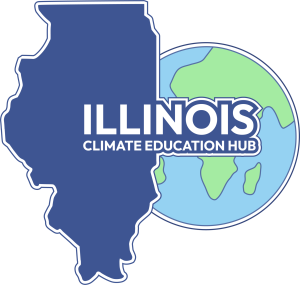
To aid teachers in following the HB 4895 bill passed by Gov. Pritzker in Aug. 2024, which requires public schools to teach climate change, the Illinois Climate Education Hub officially launched last month. The hub provides Illinois teachers with free teaching materials and lesson plans related to climate change.
HB 4895 was created by Naperville high school students and Climate Education for Illinois, a group dedicated to promoting climate education for students in Illinois schools and founded by Helen Von den Steinen and Dr. Marie Cabiya. The youth advisory boards within Climate Education for Illinois and Seven Generations Ahead, a group committed to tackling the issues of climate change with innovative and equitable solutions, provided student input while creating the hub.
Katie Stabb, an Oak Park River Forest High School alum who now studies Climate System Science and Engineering at MIT, was a member of Seven Generations Ahead’s youth board that helped to pass HB 4895. She first became involved after noticing the lack of solution-based learning in school.
“I felt like there was a lot more focus on environmental problems than environmental solutions, and that was something that kind of bothered me,” Stabb said. “Sure, we can learn about how the sea level is rising, but are you going to teach us how to write to our congress people, or let us know what environmental jobs are available?”
Stabb wasn’t alone in this realization. Wilmette resident and co-founder of Climate Education for Illinois Von den Steinen started working on the HB 4895 to positively change climate education.
“We started working with State Representative Kim Du Buclet to introduce a climate education bill into the Senate,” Von den Steinen said. “We discovered in parallel that two Naperville high school students were actually working on a bill with State Representative Yang Rohr, so we ended up bringing those two together. We advocated via filing witness slips, calling our representatives, going to Springfield, and tabling at events.”
Once HB 4895 was passed, Subject To Climate, an organization dedicated to making environmental teaching materials more accessible, stepped in to create the hub, in partnership with other North Shore environmental organizations. While Subject To Climate has its own general climate education materials, it has also helped several states with similar legislation create state-specific teaching materials. The Illinois Climate Education Hub is the eighth of these state-specific hubs.
Katie Nahrwold, an Illinois educator from Kenilworth and the Illinois State Lead for Subject To Climate, understood that although this bill was a step in the right direction, teachers needed resources to teach about climate change.
”It’s hard as a teacher. Teachers are really busy,” Nahrwold said. “They have a lot to do, a lot of demands, and it’s hard to find quality lessons that are free. A lot of times you have to pay for them, and you’re not sure if the information is accurate. Teachers have to create a lot of things from scratch.”
To address the issue of resource accessibility, the hub is creating free teaching materials that are both available to teachers and verified to meet curriculum standards.
“We’re educators, and because we’re an Illinois state hub, when teachers are searching for those resources, they can do a drop down filter that lets them know what standards would align with Illinois,” Nahrwold said. “These [materials] are vetted by teachers, reviewed by scientists, and they are aligned to national and state standards.”
Stabb believes that alongside helping teachers, the hub has an element of climate justice; it ensures that all students have free access to accurate information on climate change.
“[The hub is] leveling the playing field about climate information,” Stabb said. “I think especially for communities that are under-resourced and who might not have had climate instruction before, this will get everybody at least to a baseline level [of knowledge].”
Above all, the hub provides place-based teaching to students, which helps them understand climate change in a context relevant to them.
“These kinds of hands-on real world learning experiences really connect students to their immediate surroundings and really increase academic achievement and foster a deeper connection to their community,” Nahrwold said.
Starting climate education at an early age will also encourage students to pursue careers in the field of climate sciences.
“I’m a firm believer in every job being a climate job,” Stabb said. “So I think one of my big hopes for the bill was that it would be solutions based and I am excited for hopefully seeing some resources in the hub that can help students envision themselves in climate-focused jobs.”
Yet the hub doesn’t just benefit teachers and students.; it will create change in the larger community.
“Children are often the catalyst of change in a household,” Von den Steinen said. “They learn something in school, they bring it back to the household. They start changing household behaviors that spill into communities.”
While HB 4895 was passed, it is still an unfounded mandate, meaning that the government has not allocated funding to implement it. Looking ahead, the hub will need more donation-based funding to continue expanding its reach in climate change education.
“It’s a first prototype, it really needs fleshing out a lot more,” Von den Steinen said. “And we can only really add more resources if we get more money, and so we’re gonna have to do more fundraising.”
The Illinois Climate Education Hub is hosting a launch event on Oct. 22 to spread the word to teachers, students, and community members about its resources. The hope is that more teachers will know about and use these materials, which provide accurate, grade-specific and standardized information to aid incorporating climate change lessons into the curriculum.
“The goal is to get these resources in the hands of teachers so that they can teach about climate change, climate justice and action, and really empower their students as well,” Nahrwold said.





































